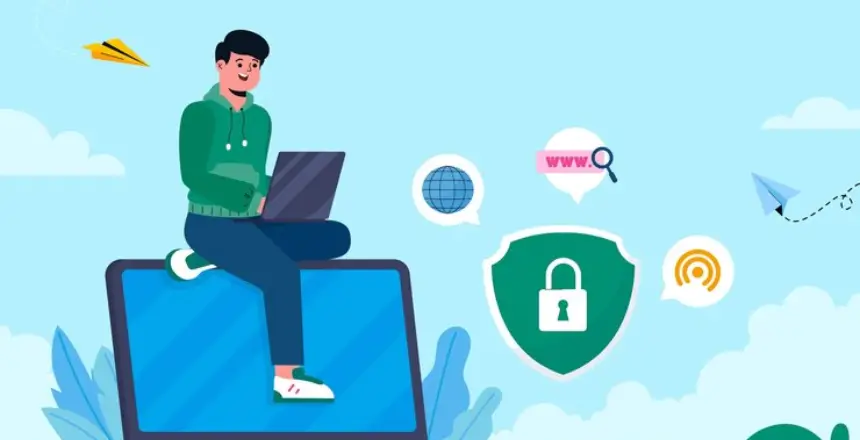Whether you’re working from home or staying connected with family and friends remotely, it’s crucial to safeguard your online personal and financial information. Cyber criminals have ramped up their use of various scams, including phishing, malware, and fake charities.
Every week brings news of another data breach. Schools, factories, websites, and even government agencies fall victim, and we all feel the impact. While you can’t stop these distant breaches, instead of lamenting, take action!
You can do a lot to safeguard your devices, data, and privacy.
Securing your devices, online identity, and activities doesn’t require much effort. Many of the following tips will help enhance your online safety.
Review Your Security Tools
Numerous great apps and settings can help secure your devices and identity, but they’re only effective if used properly. To maximize their protective power, you must understand their features and settings. For instance, your smartphone likely includes a “find my device” option—did you test it so you’ll know how to use it if needed?
Most antivirus tools can fend off Potentially Unwanted Applications (PUAs), but not all enable PUA detection by default. Check and configure your detection settings to block these annoyances. If you have a security premium package, ensure it includes advanced PUA protection.
Similarly, your security suite may have inactive components until you turn them on. Explore all settings when installing new security products, and don’t skip the interactive software walkthrough for onboarding—pay attention to all features.
Antivirus tools often include browsing protection, typically via browser extensions. Ensure these extensions are installed and working in all your browsers to avoid dangerous pages and phishing frauds.
Keep Your Antivirus Software Current
We call this software antivirus, but protecting against computer viruses is just a small part of its function. It also guards against ransomware, which encrypts files and demands payment, Trojan horse programs that steal information, and bots that turn your computer into a zombie soldier for attacks.
Effective antivirus software combats these threats and more. While it usually runs in the background, it’s wise to check it periodically. A green icon indicates all is well; yellow or red signals issues needing attention.
Although Windows has built-in antivirus, it’s inferior to third-party solutions, even free ones. Annual renewal is necessary, and automatic renewal is recommended for convenience and potential guarantees.
Additionally, consider adding free, specialized ransomware protection if your antivirus doesn’t include it.
Watch Out for Phishing Scams
Not every threat to our security comes from malware or hackers secretly accessing your account. Often, we’re deceived into giving away our passwords or personal details to malicious individuals.
These attacks can occur through email, text, or phone calls. Usually, they’re after your username and password, or maybe your Social Security number.
However, there are often clues that these messages are fake – spelling or grammar mistakes, links to suspicious websites, or emails from strange domains. If it seems suspicious, it could be phishing.
Enable Two-Factor Authentication
Two-factor authentication asks you to confirm your identity after logging in with your username and password. Sometimes, you’ll need to enter a code sent via text or email.
Other times, you’ll answer a security question. Always choose two-factor authentication when it’s available. It may take a few extra seconds to access your accounts, but it helps prevent others from logging into your accounts as well.
Create Strong Passwords
Select passwords for your financial accounts that mix uppercase and lowercase letters, numbers, and special symbols. Don’t use the same password for multiple accounts.
Even if not required, it’s wise to change them every three to six months. If you let your web browser save passwords, you can check them in your browser settings.
Steer Clear of Unsecured Public Wi-Fi
Try to steer clear of using unsecured public Wi-Fi on your devices. It can expose you to risky practices. If you have to use it, avoid entering sensitive information, such as your Social Security number or financial details, on any sites.
Even better, use a VPN, or virtual private network, while browsing away from home. This will encrypt your data, making it much more difficult to intercept.
Clear Your Browser Cache
Don’t underestimate what your browser’s cache reveals about you. Stored cookies, searches, and browsing history can indicate your home address, family details, and other personal info.
To safeguard the data that might be hidden in your browsing history, regularly delete browser cookies and clear your history.
It’s simple. In Chrome, Edge, Firefox, Internet Explorer, or Opera, press Ctrl+Shift+Del to open a dialog where you can select which browser data to erase. If you use another browser, still try this key combination; it may work. Otherwise, look through the menu options.
Safeguard Your Social Media Privacy
Social media sites let you share thoughts and photos, but it’s easy to overshare. Downloading your Facebook data reveals how much it knows about you, especially if you frequently click quizzes accessing your account.
Watch out for hackers posing as friends; they might send odd messages to hijack your account. If you receive a strange message, verify it through another method, as your friend could be scammed.
To reduce data sharing, disable Facebook’s sharing platform. This stops friends from leaking your information and prevents data loss to apps since you can’t use them. Avoid using Facebook credentials to log into other sites, which is risky.
Other platforms like Google may know even more about you, so manage your privacy there as well. Ensure posts aren’t public and think before sharing, as friends might spread your content further. By being cautious, you can enjoy social media’s benefits while maintaining your privacy.
Avoid Clicking Unfamiliar Links
Malware and viruses often spread when you click links sent by people you know. If you get a link that seems odd (like one with typos) from a trusted person, reach out to them to confirm it was intentional. It may delay your viewing of that funny video, but safety is more important.
If you prefer not to wait for their reply, paste the link into a trustworthy link checker. Just remember: avoid clicking on the link.








